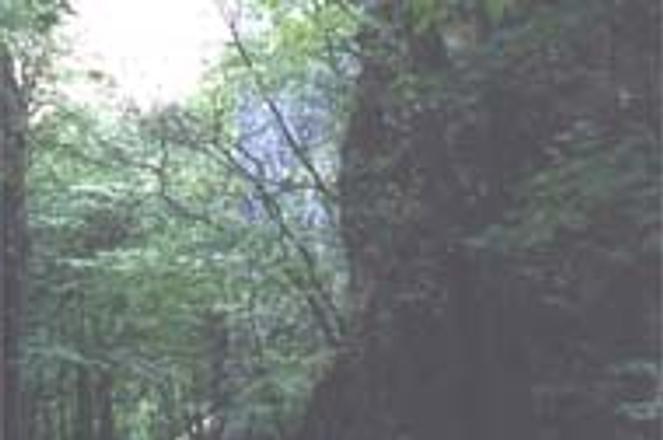While some of the forests outside Košice are protected, such as this one pictured above, others have already been put up for sale.photo: Zuzana Habšudová
The central government has welcomed a proposal by Slovakia's second-largest city (also the country's second most-indebted) to sell part of its 20,000 hectares of forest to the state for one billion crowns ($20 million). The deal would pave the way for restructuring of the city's 2.2 million crown ($45 million) debt, and would see the state become part-owner of what is thought to be one of the largest city-owned forests in Europe.
"If we manage to sign a memorandum of understanding with the government, Košice should be out of the woods," said Mayor Zdenko Trebuľa July 11.
Košice decided to sell its forests after running up a 2.2 billion crown debt under the 1994-1998 mayoral administration of current Slovak President Rudolf Schuster. With Schuster at the helm, Košice borrowed heavily to fund restoration of the city centre, including renovations of historic buildings and the installation of a musical fountain. In order to qualify for a restructuring deal offered by Žilina's Prvá komunálna banka (PKB) in fall 2000, Košice agreed to reduce that overall debt by at least one billion crowns ($20 million).
If the sale goes through, Košice will be given 15 years to pay back its remaining 1.2 billion crown ($24 million) debt.
The government and the city of Košice were still negotiating details of the sale as The Slovak Spectator went to print. Agriculture Minister Pavol Koncoš, who has supported the plan, said that by the end of August a proposal laying out the specifics of the deal would be completed. Any transaction between the state and the city would have to receive parliamentary approval, but Koncoš predicted there would be no resistance from MP's.
"This would be such a meaningful step for the financial recovery of the city that no political party could be against it," he told the Košice daily Košický Večer on July 16.
Concerns remain
The forests, which lie north-west of the city and have belonged to Košice since the middle ages, are divided into commercial (51%) and recreational and conservation (49%) zones. Košice cuts just under 80,000 cubic metres annually from the commercial zones, according to guidelines established by a government forestry office in Zvolen, selling the wood for an annual profit of around 10 million crowns ($200,000).
The government's one billion crowns would buy an as-yet-unspecified portion of the forests, which have been valued at 3.5 billion crowns ($70 million) for the entire 20,000 hectares, an area more than 800 times larger than the city itself.
City representatives emphasised that the state as a buyer was preferable to a private bidder because it was likely that the parks and conservation zones would remain as they are now - undeveloped.
"Having the state as the buyer means the impact of the sale on Košice citizens will be slight," said Košice City Council spokesman Marián Krajňák. "We expect a smooth and straight-forward agreement with the Ministry of Agriculture concerning the use of the most frequented recreational areas in the forest."
Košice announced in November 2000 that it was seeking a private buyer for the forests, a move that alarmed environmentalists. But after months of searching, no suitable parties were found.
The news of the possible sale to the state eased concerns that a private company would start widespread commercial development or wholesale logging of the sold forest area.
"Private firms are technically required to follow state plans that regulate all Slovak forests," said Juraj Lukáč of the Wolf Forest Protection Movement. "But in practice it doesn't always work that way. State ownership means better public control."
But despite his relief that Košice forests seem likely to evade corporate hands, Lukáč called the sale of forests to pay off city debts "a dangerous precedent" for Slovakia. Many of Slovakia's cities are heavily indebted, including Bratislava, which is 4.5 billion crowns ($90 million) in arrears, and Banská Bystrica, 1.3 billion crowns ($26 million) in the red and having only this week staved off bankruptcy through a deal with PKB.
"Keeping healthy forests is perhaps most important for maintaining a normal water cycle. With no forests, rainy seasons become floods and dry seasons droughts," Lukáč said. "In the past in Slovakia we have seen private companies buy public forests and engage in excessive logging, devastating the micro-climate. Once you cut a forest down, you can never get it back."
Jaroslav Mrva of the ZMOS association of Slovak towns and cities said that while other indebted Slovak cities were unlikely to sell forests, some might follow Košice's lead in selling other types of property to pay for spending sprees, a practice that only spells more financial problems in the future, he said.
"Those [Bratislava and Banská Bystrica] are the only [other] Slovak cities with serious debt problems, and as far as I know neither are considering selling forests," he said. "But they might end up parting with other properties to get out of debt, which isn't good management. When a city sells off its property, it loses what could otherwise be used as collateral for raising capital in the future."
Additional reporting by
Zuzana Habšudová


